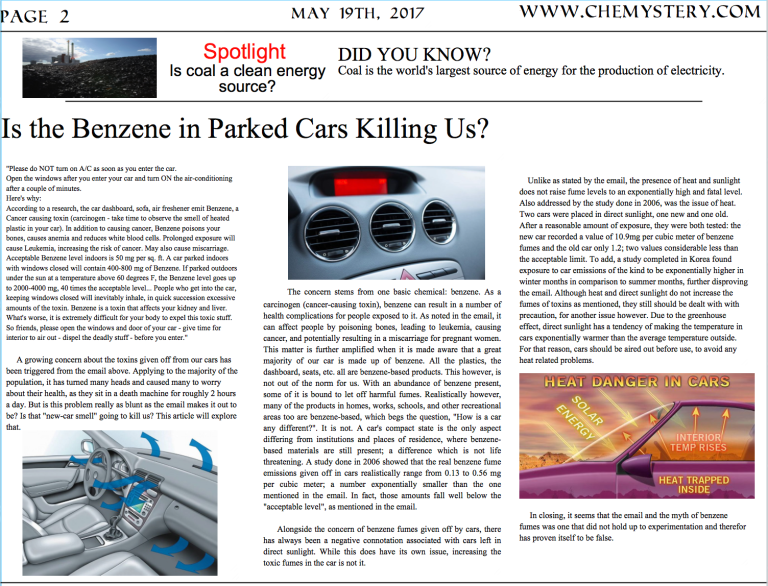
Chemistry ISU Part 2:
- http://blogs.cancer.org/expertvoices/2011/07/19/is-your-car-killing-you-with-benzene/
- http://www.seattletimes.com/nwshowcase/automotive/the-heavenly-new-car-smell-has-a-dark-side/
For:
Parked cars still obtain a substantially large amount of benzene and chemicals in them. As the chemical makes up a large portion of all the plastics in the car, when one turns on the air conditioning in the car, all of those toxins are being blown towards people. In addition, benzene is a carcinogen, meaning it is a cancer-causing chemical, so prolonged exposure to such can make people very ill.
Expanding on the last point, this article speaks of the toxins in cars more generally, but more specifically, focuses on how their effects seem to dramatically increase when exposed to heat. Starting out with rates at which children and animals are being killed in heated cars, the article expands on that notion stating that the increased effect of these chemicals are partially to blame.
Both these articles both revolve around one piece stronger piece of evidence: an email stating just how deadly the effects of benzene in parked cars is. Initially it states some of benzene’s deadly effects: cancer-causing, poisons bones, causes anemia, reduces white blood cells, leukemia, and potentially a miscarriage. In reality, a lot of our day to day products are made from benzene, and an ideal expose amount to it indoors would be 50 mg per sq. ft. The amount received in cars is far higher however. A parked car with all windows closed may experience 400-800 mg, however, that number skyrockets to 2000-4000mg when exposed to temperatures of higher than 15 degrees Celsius.
Against:
This article references the American Cancer society multiple times discrediting the apparent effects of benzene in parked cars. A study by Snopes.com found that commuters are exposed to a number of hazardous chemicals on their journey, primarily from the burning of fuel, but none of which dealt with internal components in the car. In addition, that same study found that exposure levels of aforementioned chemicals were much higher in the winter months, than the summer months. This article proceeds to discrediting the email, stating the total amount of volatile organic compounds in a new car is stated to be a tenth claimed in the email.
This last article takes a different approach to the matter. Instead of completely discarding the issue, it recognizes it, and applies logical reasoning to it. Starting with the email, this myth is broken down. The article agrees with the fact that a large portion of our car is benzene-based, and believes that some of these products do have the potential to emit benzene. On another note however, so many of the products in our households do too. But the question is asked, “How much?”, A 2006 study shows that the fumes given off range from .013 to .56 mg per cubic meter; a number exponentially smaller than the 400mg to 4000 mg per square foot stated in the email. The issue of heat was then addressed. Two cars, one new and one old, were parked in the sunlight and recorded. While the new car produced 10.9 mg per cubic meter, the old car only produced 1.2mg. As a result, through the use of a number of studies and analysis, it was observed that there is no toxic amount of benzene given off in parked cars.
http://www.makemynewspaper.com/designer/app/open?share=52c0b5917327f0171d’